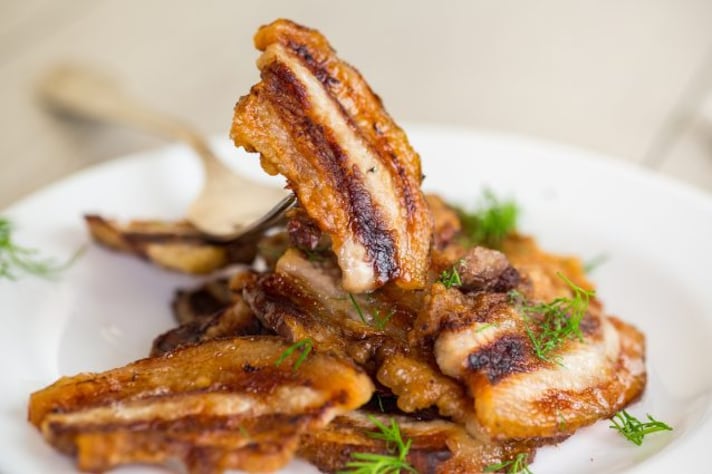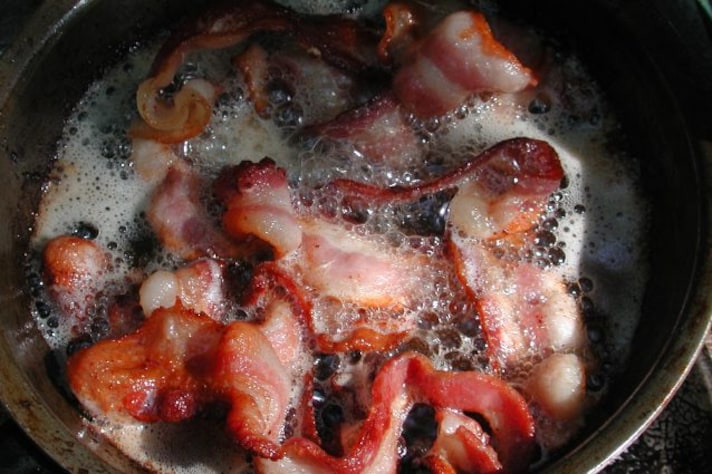
There’s nothing quite like the smell of bacon sizzling away on a Saturday morning, paired with a runny egg and a cup of coffee. Bacon and eggs are the dynamic duo of breakfasts—the perfect fuel to kickstart your day. But as wonderful as this combo is, it can quickly turn into a salt-induced nightmare if your bacon is too salty. Whether you realize it while prepping the bacon or after it’s already cooked, an overpowering saltiness can make that crispy, savory delight more of a chore than a joy. But don’t despair! There are ways to salvage overly salty bacon and restore balance to your breakfast.
Why Can Bacon Be Too Salty?
Bacon is naturally salty, as it’s traditionally cured with a mix of salt, sugar, and sometimes nitrates. The curing process preserves the meat and gives it that distinctive flavor we love. However, sometimes bacon can end up far saltier than expected. This can happen for a few reasons. First, pre-packaged bacon from certain brands might use a heavier hand with the salt during the curing process. If the brand is unfamiliar, you might find yourself biting into a strip that tastes like it spent a week in a salt mine. Another culprit is overcooking. When bacon is cooked for too long or at too high a temperature, the fat and moisture evaporate, intensifying the saltiness. This is why some batches can seem fine raw but turn into salt bombs once they hit the pan.

How to Fix Uncooked Salty Bacon
If you’ve discovered your bacon is too salty before cooking, you’re in luck—there are a few methods you can try to tone down the saltiness before it’s too late. These fixes require a little extra time, but they can save your breakfast from turning into a sodium overload.
The Soaking Method
One of the simplest ways to reduce the salt in uncooked bacon is by soaking it in water. Just place the bacon strips in a bowl of cold water and let them sit for about an hour, or even overnight if you have the time. This helps draw out some of the excess salt, making the bacon less salty when you cook it. Once it’s soaked, pat the strips dry with paper towels to ensure they fry up nice and crispy.
The Blanching Method
If you’re short on time, blanching the bacon can work wonders. Bring a pot of water to a boil and briefly boil the bacon strips for a minute or two. This quick dip helps to release some of the salt without affecting the texture of the bacon too much. Once blanched, drain the strips, dry them off, and cook as you normally would. Your bacon will still have its savory bite, just without that overwhelming saltiness.

How to Fix Salty Bacon After It's Been Cooked
So, you’ve cooked the bacon, only to take a bite and realize it’s way too salty. What now? While you can’t entirely undo the salt, there are a few tricks to salvage the situation and make it more palatable.
The Rinsing Method
It might sound strange, but one option is to give your cooked bacon a quick rinse. Run the bacon under lukewarm water for a few seconds, then pat it dry. This can help wash off some of the surface salt without turning the bacon into a soggy mess. Just be careful not to soak it too long—you want to remove some salt, not wash away all the flavor!
The Oven Method
Another option is to give your bacon a stint in the oven. Lay the cooked bacon on a baking sheet lined with parchment paper and pop it in a low-temperature oven (around 300°F) for about 10 minutes. The idea here is that the heat can further render out some of the fat and moisture, reducing the intensity of the salt. It won’t remove all of it, but it can mellow the flavor and make the bacon more enjoyable. You might also try crumbling the overly salty bacon and using it as a topping for salads or baked potatoes, where it can mingle with other ingredients and spread the salt around a bit more evenly.

How to Ensure Perfectly Salted Bacon Every Time
To avoid the salty bacon dilemma altogether, it’s best to take a few preventive measures. First, always check the packaging of your bacon for clues about how salty it might be—brands that use “extra cure” or similar labels might be saltier than others. When cooking, keep a close eye on your bacon to avoid overcooking, as this will only intensify the saltiness. If you’re feeling adventurous, you could even try curing your own bacon at home, which gives you full control over the salt levels.
And finally, balance is key. If you’re pairing bacon with other foods, like eggs or toast, go easy on the added salt in those dishes. Let the bacon do the heavy lifting in the flavor department so your breakfast isn’t overwhelmed. After all, bacon’s natural charm lies in its ability to be savory and indulgent without overpowering everything else on the plate.
;Resize,width=767;)
